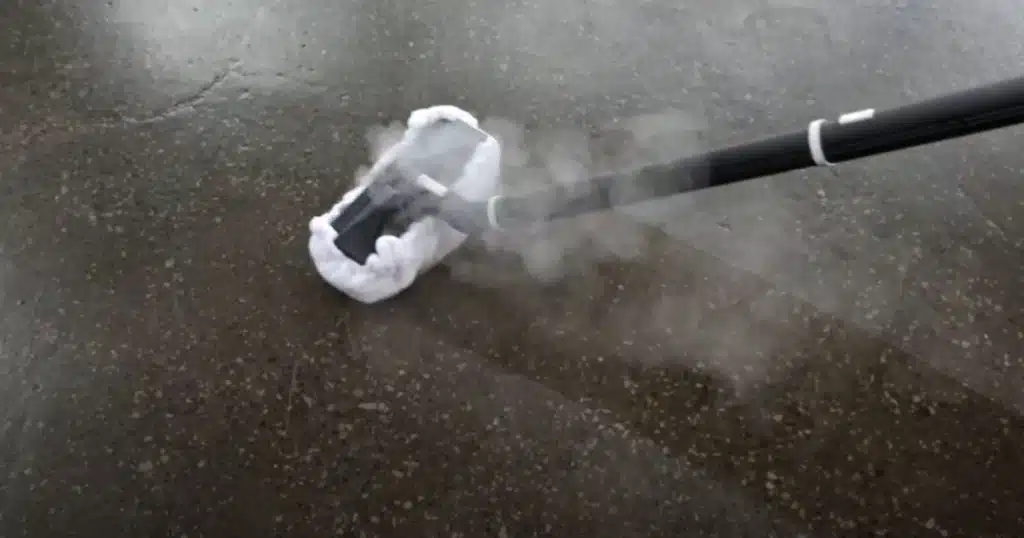As an Amazon Associate I earn from qualifying purchases.
Concrete floors are known for their durability and low-maintenance requirements, making them a popular choice in garages, basements, and industrial spaces. However, over time, even concrete can accumulate dirt, grime, and unsightly stains. One question that often arises is, “Can you use a carpet cleaner on a concrete floor?” While carpet cleaners are typically designed for softer, fabric-based surfaces, they can also be used effectively on concrete when applied correctly.
In this comprehensive guide, we’ll explore how a carpet cleaner can be used to clean concrete floors, what precautions to take, and some alternative methods you can consider for maintaining the cleanliness of your concrete flooring.

Can You Really Use a Carpet Cleaner on Concrete Floors?
Using a carpet cleaner on a concrete floor is generally safe, but it’s important to take precautions since different types of concrete surfaces may need special care.
The safety of using a carpet cleaner on concrete also depends on the type of cleaner and the solution used.
Types of Concrete Floors
Sealed vs. Unsealed Concrete
Concrete floors come in two main types: sealed and unsealed. Sealed concrete has a protective coating that shields it from stains and water damage, while unsealed concrete is porous, making it more prone to absorbing moisture and dirt.
Stained or Polished Concrete Floors
Many concrete floors are stained or polished to give them a decorative look. These finishes can change the cleaning requirements and susceptibility to damage, especially when using powerful cleaning machines.
Advantages of Using a Carpet Cleaner on Concrete Floors
Though carpet cleaners are typically meant for fabrics, they offer several unique advantages when applied to concrete floors:
- Versatility: You can use a single machine to clean multiple surfaces in your home or business, from carpets to concrete, saving you the cost of buying separate machines.
- Deep Cleaning: The combination of water, detergent, and agitation allows the machine to penetrate deeply into the porous surface of concrete, ensuring that dirt, grime, and stains are effectively lifted.
- Cost-Efficiency: If you already own a carpet cleaner, there’s no need to rent or purchase a specialized hard-floor cleaner, making it a more cost-effective solution.
Potential Drawbacks
While carpet cleaners can work on concrete, there are a few limitations to be aware of:
- Not Ideal for Polished Concrete: If you have polished or sealed concrete floors, a carpet cleaner with stiff brushes may cause scratches. For polished concrete, opt for gentler cleaning methods such as mopping or using a steam cleaner.
- Struggle with Tough Stains: While carpet cleaners are effective for regular cleaning, tougher stains, especially oil or chemical spills, might require more heavy-duty equipment such as a pressure washer.
- Water Absorption: Since concrete is porous, it absorbs water quickly. Excess moisture left behind after cleaning can lead to mildew or efflorescence (a white, powdery residue on the surface), particularly in areas with poor ventilation.
Best Practices for Cleaning Concrete Floors with a Carpet Cleaner
If you decide to use a carpet cleaner on concrete, following these best practices will help you achieve the best results.These steps will ensure you clean effectively while minimizing any potential damage.
Preparing the Concrete Surface
Before using the carpet cleaner, ensure that the concrete floor is clear of any loose debris.
Vacuum or sweep the area thoroughly to remove dirt, dust, and small particles.
This will prevent the carpet cleaner from pushing debris deeper into the concrete’s surface.
Choosing the Right Carpet Cleaner Solution
Not all cleaning solutions are suitable for concrete floors.
When using a carpet cleaner, opt for a cleaning solution designed for hard surfaces or concrete.
Avoid harsh chemicals, as these can damage the concrete or leave behind residue that’s difficult to remove.
Alternative Cleaning Methods for Concrete Floors
While carpet cleaners can be a convenient option, there are several alternative methods to clean concrete floors that might be more suited to specific types of stains or environments:
Pressure Washing
One of the most effective ways to clean concrete, especially outdoors, is through pressure washing. The high-pressure water stream effectively blasts away dirt, oil, and grime, making it ideal for driveways, patios, and garage floors. However, this method is generally too intense for indoor spaces like basements.
Steam Cleaning
Steam cleaning can be another excellent alternative, especially for sealed concrete floors. It uses high heat to sanitize and clean without chemicals. This method is both environmentally friendly and highly effective at disinfecting concrete surfaces.

Specialized Concrete Cleaners
For especially tough stains or industrial areas, specialized concrete cleaning solutions can be applied directly to the floor and scrubbed in with a stiff brush. These cleaners are engineered to tackle the toughest dirt, grease, and stains.These cleaners are built to handle the most stubborn dirt, grease, and stains.
Mop and Bucket
For routine maintenance and light cleaning, a simple mop and bucket with warm water and mild detergent is usually sufficient for sealed concrete floors. Regular mopping prevents the build-up of dirt and grime, keeping your concrete floors looking fresh.
Final Thoughts: Should You Use a Carpet Cleaner on Concrete Floors?
Using a carpet cleaner on concrete floors is possible, but it’s not always the best option.
The machine can offer a quick solution for light cleaning, but it may not provide the deep clean that some concrete floors need.
Be mindful of the risks, such as leaving excess water behind, and consider alternatives like pressure washing for more intensive cleaning needs.
In the end, if you choose to use a carpet cleaner, following proper procedures will help you achieve a clean and safe concrete surface.
Frequently Asked Questions
Yes, using a carpet cleaner on concrete floors can potentially cause damage if the cleaner is not suitable or if used improperly. It’s important to ensure the cleaner is designed for concrete surfaces and follow the manufacturer’s instructions to avoid any damage.
For cleaning concrete floors, a cleaner specifically formulated for concrete is ideal. These cleaners often have powerful degreasers and are designed to lift stains and dirt effectively without damaging the surface.
The frequency of cleaning concrete floors depends on foot traffic and whether there are spills or stains. Generally, high-traffic areas may need weekly cleaning, while less frequently used areas can be cleaned monthly or as needed.
Carpet cleaners can assist in removing some stains from concrete, but their effectiveness varies based on the type and age of the stain. For stubborn stains, using a concrete cleaner with specific stain-fighting properties might be more effective.
Professional cleaning is not always necessary but can be beneficial for deep cleaning or if dealing with heavy stains and grime. Professionals employ specialized equipment and cleaning solutions to effectively restore the appearance of concrete floors.
Amazon and the Amazon logo are trademarks of Amazon.com, Inc, or its affiliates.
Leave a Reply